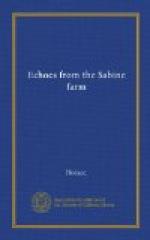Dame Fortune plays me many a prank.
When she is kind, oh, how I go it!
But if again she’s harsh,—why, then
I am a very proper poet!
When favoring gales bring in my ships,
I hie to Rome and live in clover;
Elsewise I steer my skiff out here,
And anchor till the storm blows over.
Compulsory virtue is the charm
Of life upon the Sabine farm!
CHLORIS PROPERLY REBUKED
Chloris, my friend, I pray you your misconduct to
forswear;
The wife of poor old Ibycus should have more savoir
faire.
A woman at your time of life, and drawing near death’s
door,
Should not play with the girly girls, and think she’s
en rapport.
What’s good enough for Pholoe you cannot well
essay;
Your daughter very properly courts the jeunesse
doree,—
A Thyiad, who, when timbrel beats, cannot her joy
restrain,
But plays the kid, and laughs and giggles a l’Americaine.
’T is more becoming, Madame, in a creature old
and poor,
To sit and spin than to engage in an affaire d’amour.
The lutes, the roses, and the wine drained deep are
not for you;
Remember what the poet says: Ce monde est
plein de fous!
TO THE FOUNTAIN OF BANDUSIA
O fountain of Bandusia!
Whence crystal waters flow,
With garlands gay and wine I’ll pay
The sacrifice I owe;
A sportive kid with budding horns
I have, whose crimson blood
Anon shall dye and sanctify
Thy cool and babbling flood.
O fountain of Bandusia!
The Dog-star’s hateful spell
No evil brings into the springs
That from thy bosom well;
Here oxen, wearied by the plow,
The roving cattle here
Hasten in quest of certain rest,
And quaff thy gracious cheer.
O fountain of Bandusia!
Ennobled shalt thou be,
For I shall sing the joys that spring
Beneath yon ilex-tree.
Yes, fountain of Bandusia,
Posterity shall know
The cooling brooks that from thy nooks
Singing and dancing go.
TO THE FOUNTAIN OF BANDUSIA
O fountain of Bandusia! more glittering than glass,
And worthy of the pleasant wine and toasts that freely
pass;
More worthy of the flowers with which thou modestly
art hid,
To-morrow willing hands shall sacrifice to thee a
kid.
In vain the glory of the brow where proudly swell
above
The growing horns, significant of battle and of love;
For in thy honor he shall die,—the offspring
of the herd,—
And with his crimson life-blood thy cold waters shall
be stirred.
The Dog-star’s cruel season, with its fierce
and blazing heat,
Has never sent its scorching rays into thy glad retreat;
The oxen, wearied with the plow, the herd which wanders
near,
Have found a grateful respite and delicious coolness
here.




